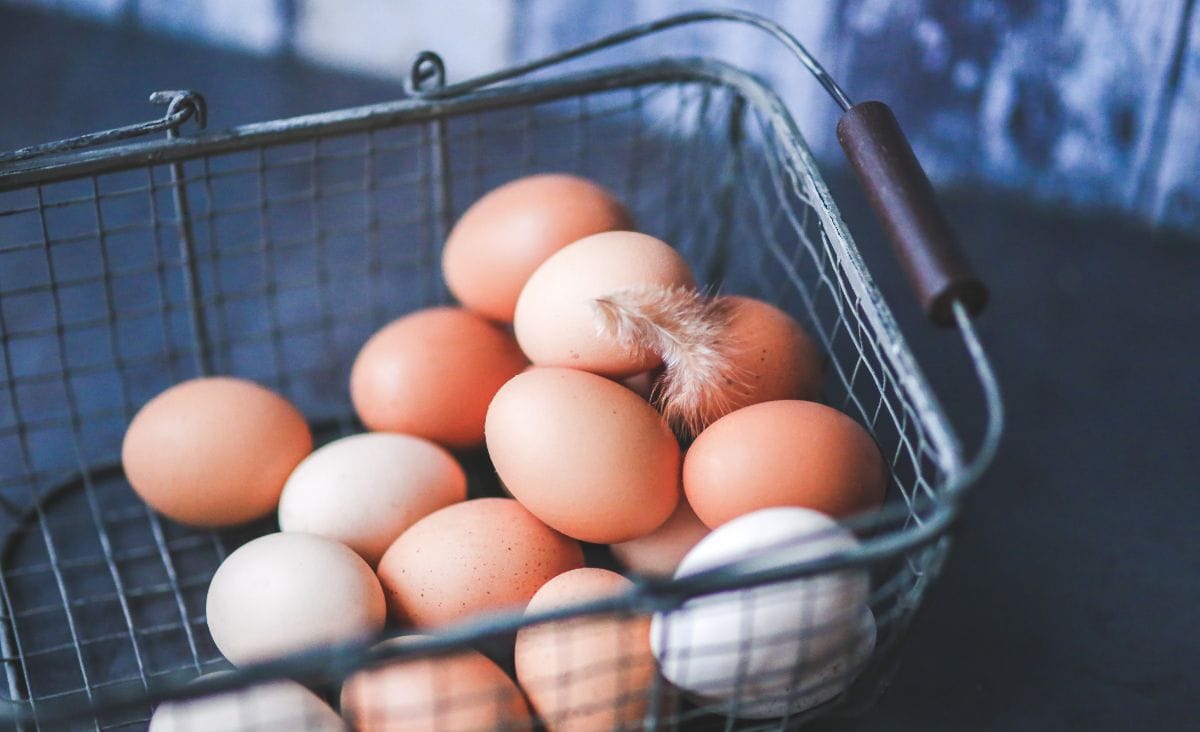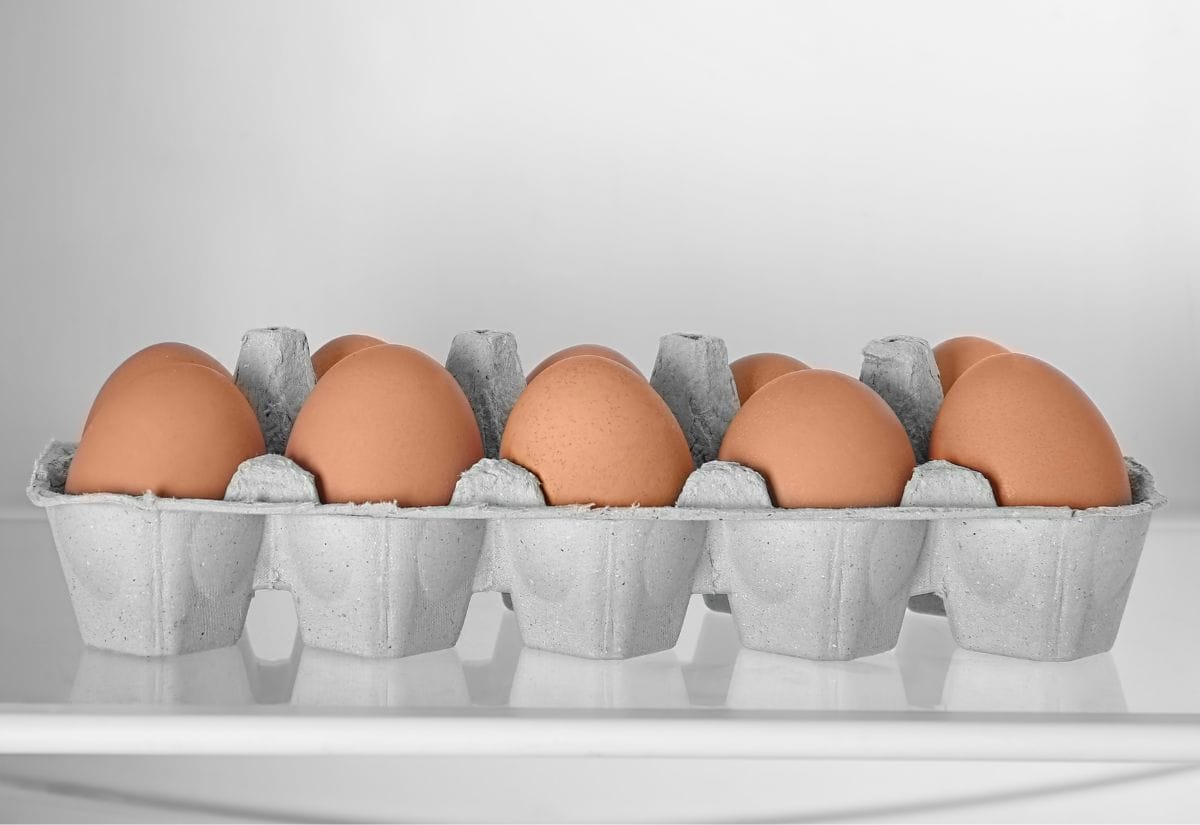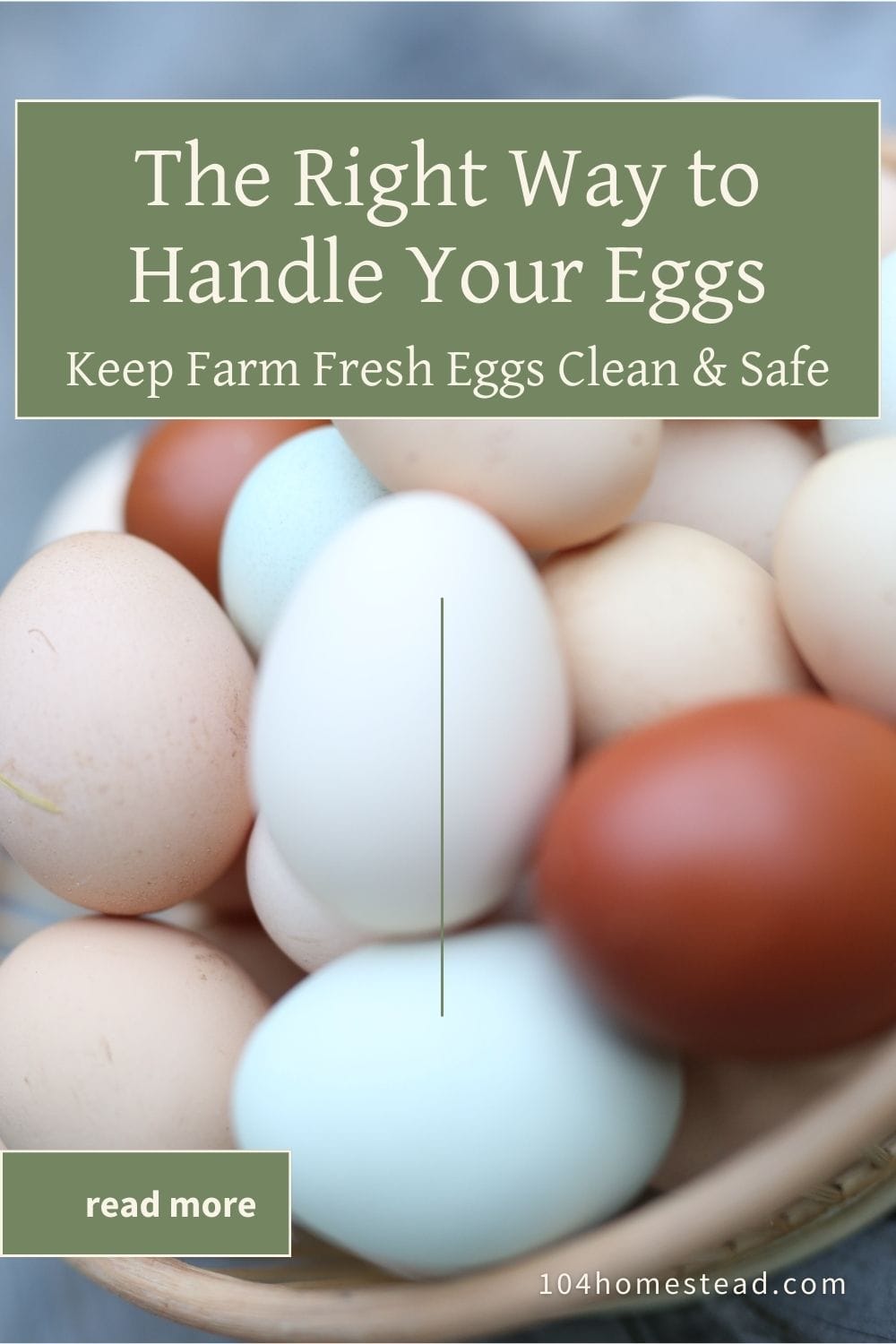Essential Egg Handling Tips: Keeping Farm Fresh Eggs Safe
Learn how to keep your farm-fresh eggs clean and safe with these expert tips on egg handling, storage, and alternatives to washing.

Farm fresh eggs are a prized addition to any kitchen, but handling them correctly is essential to ensure they’re safe to eat. Whether you’re collecting them straight from your backyard coop or purchasing them at a local farm stand, knowing how to properly store and care for eggs can make all the difference.
In this post, we’ll dive into the key practices for handling farm fresh eggs safely. From the debate over washing eggs to the differences between U.S. and European guidelines, we’ll help you make informed decisions. Whether you’re a seasoned homesteader or new to raising chickens, these egg-handling tips will simplify your routine and keep your eggs safe and delicious.
Why Safe Egg Handling Matters
Eggs are a nutrient-packed food, but improper handling can pose a risk of bacterial contamination, such as salmonella. Understanding how to care for your eggs from collection to storage is critical for ensuring safety and maximizing freshness.
U.S. Guidelines: Wash and Refrigerate
The U.S. Food and Drug Administration (FDA) requires eggs sold commercially to be washed and refrigerated to minimize the risk of contamination. Here are the key takeaways:
- Washing Eggs: Eggs undergo a cleaning process that removes dirt and bacteria but also strips the natural protective coating (bloom).
- Refrigeration: After washing, eggs must be kept at 45°F or lower to prevent bacteria growth.
- Shelf Life: Refrigerated eggs can stay fresh for up to three weeks. Always store them in their original carton to reduce moisture loss and odor absorption.
Pro Tip: If you collect eggs from your backyard flock, consider washing them only if they are visibly dirty and refrigerate them immediately after.

European Guidelines: Keep Eggs Unwashed and Room Temperature
In Europe, the approach is entirely different. Eggs are neither washed nor refrigerated, based on the belief that the natural bloom acts as a barrier against bacteria. Key points include:
- Unwashed Eggs: Preserving the bloom prevents moisture and bacteria from penetrating the shell.
- Room Temperature Storage: Eggs are stored in cool, dry conditions away from direct sunlight.
- Encouraging Clean Practices: Farmers focus on keeping nesting boxes clean to minimize dirt on eggs.
Fun Fact: In many European countries, eggs are sold on shelves near bread and dry goods rather than in the refrigerated section.
To Wash or Not to Wash?
The decision to wash eggs often comes down to personal preference and local practices. Here are some things to consider:
If kept at room temperature, unwashed eggs can last up to two weeks due to the protective bloom. They’re ideal for small homesteads or immediate use. Washed eggs require refrigeration to remain safe, but they have a longer shelf life when stored cold. This is a good option if you sell or store eggs for an extended period.
Best Practices for Storing Farm Fresh Eggs
- Collect Eggs Promptly: Gather eggs at least twice a day to reduce the risk of contamination from dirt or bacteria.
- Inspect for Cleanliness: Use a soft brush or cloth to gently remove dirt without washing if you plan to store them at room temperature.
- Refrigeration Tips: Store eggs pointed-side down in the carton to maintain freshness and prevent the yolk from touching the air pocket.
- Label Your Eggs: Write the collection date on the carton to keep track of freshness.
My Egg Handling Routine
As someone who raises chickens, I’ve tried both U.S. and European methods. Here’s what works best for me:
I collect eggs several times a day and store them in an egg skelter on my counter to keep them fresh and organized. For customers, I typically provide washed and refrigerated eggs, unless they specifically request unwashed eggs for room-temperature storage. When selling to health food stores, I adhere to FDA protocols by ensuring all eggs are properly washed and refrigerated to meet compliance standards.
FAQs on Cleaning and Handling Farm Fresh Eggs

How to Keep Your Eggs Clean Without Washing
Maintaining clean eggs starts with proactive care in your coop and nest boxes. Ensure that bedding in the nesting boxes is always clean and dry, as this significantly reduces the chance of dirty eggs. Using sand bedding in your coop can further minimize mud and moisture, keeping eggs naturally cleaner. Collecting eggs frequently throughout the day is another simple but effective way to prevent excessive exposure to dirt and bacteria.
If you’re hesitant to wash your eggs, there are alternatives to maintain cleanliness while preserving the protective bloom. Lightly soiled eggs can be cleaned using a dry cloth or brush. For eggs that are visibly dirty, consider reserving them for immediate use to ensure their freshness and safety.
Want Cleaner Eggs? Pin These Must-Know Tips!

Egg handling doesn’t have to be complicated. By following these best practices, you can enjoy the full benefits of farm fresh eggs safely and confidently. Whether you prefer the U.S. approach of washing and refrigerating or the European method of preserving the bloom, the key is to adopt a routine that works for you. With proper care, your eggs will stay fresh, safe, and delicious for weeks to come.
Keeping your chickens healthy and safe plays a significant role in producing clean, high-quality eggs. Understanding how to isolate new or sick birds is key to maintaining a healthy flock. Protecting your chickens from predators also ensures your birds—and their eggs—stay safe and sound. And for those curious about the beautiful variety of egg colors your hens can produce, you’ll love learning more about what influences those hues.
How do you handle and store your eggs—are you team countertop or team refrigerator? Share your tips and experiences in the comments below!





We are JUST starting to get eggs (3 this week!!). I plan on selling them in the near future as we have 19 pullets. How do you determine amt to sell them for? How do we get away with not giving them refrigerated eggs? I’m not planning on putting them in a fridge unless necessary, this is an issue…we live close to Amish country & they sell their unfridgerated eggs and don’t get in trouble.
Thx. Love your post
Check Craigslist to find the going rate for eggs in your area. Even in my area it can go from $2-5 a dozen, but we settled on $3.
As far as unrefrigerated eggs, I always have a dozen or two sitting in the fridge for new customers. When I meet them I let them know about the benefit of unwashed/room temperature eggs. They are always excited to try them and so we do unwashed from that point on.
Hi, what are the benefits of unwashed/room temperature eggs? I’m new to having chickens and they are now laying..trying to learn as much as possible. Thanks
It clears up space in the fridge and they make for a fluffier product when you’re making egg dishes or baking with them.
We simply brush any dirt, poop or anything else off our eggs with the scrubber side of a dry dish sponge and keep them at room temp on the kitchen counter. Never had a single problem…. But some people are uncomfortable with un-refrigerated eggs. Their loss.
Would also like to see your crochet egg basket 🙂
My grandparents were cattle farmers but kept chickens personally for meat and eggs. She always put the eggs in a wire bowl on a lower open shelf cabinet (close to the floor – cooler there), out of the sunlight when she gathered them and used as needed. I was always told to use the eggs within a month after gathering. If they have a bit of dirt, I gently brush them off by hand before I put them in a wire bowl. Before I crack them for use, I do a quick rinse under warm water. I still don’t refrigerate, I’m almost 60 and still kickin and rarely get sick! I’ve had folks ask me if I was worried about bacteria…I tell them only would be if the eggs came from a commercial farm. My girls eat good feed mixed with seeds and flax, plenty of crushed oyster shell available to them, clean water, and I always keep a head of cabbage or two in the run hanging for them to peck at and eat (keeps them busy on bad weather days when I can’t let them out to free range). I’m in the southern US where we get really hot summers and give the girls a whole cut up watermelon weekly during the hottest times. No egg at a store will have the nutrition packed in the way the eggs from my girls do – another reason to keep your own chickens.
Amen Nan. I always tell people you only have to worry about unhealthy eggs when they are produced by unhealthy birds.
I have been raising backyard flocks for 5 years. My great-gran had them for years and years. I learned a lot from reading because when I decided on birds my gr-gran Clara was gone, but my gran Ro (83), her daughter, remembers well what her mom used to do. We talk chicken antics a lot. I remember Clara having meat birds when I was a kid in the late 70s and early 80s, but she did have some laying hens as well.
I only refrigerate in winter…BUT…I don’t get many in winter because I do not artificially light my birds. We live in Nebraska, we have cold winters for sure. I like to give my girls a break and have found that fewer eggs in the winter means more regular laying the rest of the months, even from old girls.
Sometimes I get a poopy egg, I wipe it off with a draw cloth and put it in my antique egg bowl, then wash only before I crack it. I have stored eggs in this bowl for weeks and weeks and never worried about contamination. I also have used the old-timer float test if I have ever been worried. Luckily I have never had a bad egg from one of my girls.
My son “forgot” to check one of our nest boxes early last spring, I couldn’t figure out why the girls weren’t laying. I have one older blue Orpington hen, one silkie who doesn’t make eggs often, and one young mutt hen so someone should have made at least 1 egg at the point that we were at. Their next boxes are on opposite ends of the a-frame tractor I built. Finally, I did the chicken chores instead of trusting the teenager. I harvested over 2 dozen eggs from the box “they never use Mom!.” Weather was in the 30s and 40s, when we found the eggs, I float tested them all, not a bad one in the batch and then I did refrigerate. My family enjoyed them all and no one ever was sick. I have had bad eggs (float tested) from the grocery in the good old US of A. The salmonella scare in Iowa hatcheries in 2010 prompted my chicken journey and I haven’t ever regretted the decision to keep hens in the big city!
Following the practices of my ancestors, who clearly survived well, makes me very proud to continue their practices in more modern times.
Cheers to all and happy egg collecting.
dwegz
That’s so wonderful!
This was a wonderful read. I appreciate your informative viewpoint. I find it strange my mother was raised in Ireland during a simpler time, yet, she has fully bought into all the US standards. When I try to get her to try some of my homemade products or fresh produce she’s very leery. We also live in Nebraska & had to work our way around city politics to get our hens. I think it’s fantastic Omaha allows chickens even on smaller properties. We have nearly an acre (not huge, but these days more than most people we know) and our town was not pro chicken. We’ve had our hens just 5 months now and they bring so much happiness and laughter to our daily routine. My husband was really irked by the cost of the coop (that he designed and built himself…..he can’t do things on the lower end) but he has been amazed at the difference in the eggs. We are steadily getting 4 a day now and waiting on another 1 or 2 hens (1 may be a rooster). I’m glad we can provide our family with the knowledge of how food is produced (and how things should be done). We do refrigerate because we have plenty of room, but we don’t wash until just before use. Thank you for tidbit on water temperature because I was not aware of that. I’m hoping to find interest in buying our extra eggs to offset the price of their feed, but even that hasn’t been too bad with their natural foraging habits (not to mention them getting all our scraps and letting them in the garden to eat all the fallen tomatoes).
I would love to see a picture of the crochet egg basket.
In the warmer months I allow my eggs to sit on the counter until the basket is overflowing and then I will wash them and put them in a carton and make the rounds to my customers. Any leftovers get refrigerated. In the colder months (i live in Michigan), the eggs are already cold when I collect them. Therefore I wash and refrigerate them. But as someone already said, my eggs don’t last very long before they are eaten my someone and I have yet to have a complaint so I guess all is well.
I collect my eggs once a day. Then I place them in a tray on my counter until I use them. I do not wash or refrigerator them.
Good info! But I think it depends whether you have a rooster running with your chooks, to if you refrigerate your eggs. Same with a duck and drake. I guess it also depends on climate as well. I live in Tasmania in Australia so our weather can go from raging hot in summer to chilly in winter.My dad and mum used to raise baby chicks n ducks for the rural schools, so there was always roosters and drakes running with the chools and ducks. To stop the egg from developing you put it in the fridge. If you don’t you can end up cracking a half developed egg into a cake mix, which by experience isn’t a pleasant thing. When i was a kid we ven had a few eggs hatch from just being left on a bench in the laundry in summer, so yeah I put mine in the fridge for 9 months of the year to be on the safe side, plus they seem to last way longer in the summer months that way.
Thanks for your great article! I started keeping chickens this year, after a lot of input from a friend who homesteads ‘the old fashioned way,’ and a lot of personal study and research. Equipped with an understanding of egg collection and storage that you have outlined above, the task for me was also to collect the cleanest eggs possible. That means maintaining the cleanest nesting boxes possible. Eggs generally come out of the chicken quite CLEAN. It is only when they are laid on a pile of poop, or kicked around by another hen who tracked in mud and poop on her feet that there is contact with yucks. So the first task is to keep the hens from ROOSTing in the NESTing boxes, and keep those nesting boxes clean. I also switched from the fine shavings that I use on the coop floor in the nesting boxes (it can stick to the bloom), to some very good, leafy hay from my neighbor’s farm. The girls love the hay (not hard, stiff straw), it is easy to ‘shake out’ if a wayward poo finds its way in there, and easy to replace.
A truly dirty egg gets rinsed off, and usually put aside for my girl’s breakfast (Golden Retriever). She loves a healthy, raw egg cracked over her kibble.
As for keeping out of the refrigerator for freshness, I try to maintain about a 10-day to 2-week limit on counter life before refrigerating. I keep my windows open as much as possible throughout the summer, which means my house can hit around 80 degrees – and now that my Roo is quite “active” I wouldn’t want any of those eggs to consider ‘developing’ – haha. 😉
I completely understand your concern about warm temperatures and a “busy” roo. I had similar concerns when I first started with roosters. Humidity plays a huge part in egg development. Although not impossible, it is unlikely that an embryo will begin developing on the kitchen counter. Hey, better safe than sorry though, right? My eggs are out the door or are in tummies before I’ve had the chance to put it to the test.
Congratulations on your new flock. I hope I can provide you with a lot of great resources. It sounds like you have a great friend to guide you on your way, but if you ever have questions, feel free to get in touch.
Not yet, but you can bet I will!
No Jessica, I haven’t yet, but you can bet I will soon!
Thanks, Dody
This is a great post, I’ve only had my chickens for a short time. We always had them growing up. I can’t remember Mom washing the eggs. I have been spot cleaning mine & keeping them in the frig. They are always gone or sold within 4 or 5 days.After reading your post, no more washing(unless really dirty) or refrigerator. They are always pretty clean, since I keep the nest boxes clean. Thank so much for this great post, I’ve learned so much. Dody
Dody,
I’m so glad you are finding my posts helpful. Have you tried baking with your eggs stored at room temperature? You will be amazed. So light and fluffy 🙂
Great post!
I just finished a ton of research for a similar article. What was evident to me is that it’s actually the way our eggs are farmed in the US that caused the need for washing. When several chickens are housed in a small cage, with a cage above them and a cage above them…..the exposure to salmonella becomes many times higher. They simply have to wash the eggs. In other countries where eggs are farmed in a more traditional approach they don’t have this high of an exposure rate which makes the eggs safer to store at room temperature.
If the US would switch back to traditional farming for our eggs (like us homesteaders and backyard farmers) washing wouldn’t be necessary anymore.
Loved this.
Lisa M
Amen! And it’s not just eggs. It’s a lot of our food production.
I think that a big part of the difference between US and EU is that in the US the commercial market is so large that pesticide use results in the need to REALLY wash produce well, and large commercial animal farms are so overcrowded that good animal hygiene is severely lacking resulting in a higher incidence of diseases contracted from commercial animal products. It seems that the EU sees a larger percentage of its produce and animal products coming from smaller family style farms and homesteads which results in safer products and better handling procedures. Perhaps one of the fine folks on here from the EU can shed light on whether my hypothesis holds water or not. 🙂 I will say that the removal of people from food production has led to misconceptions about food safety. The fact that most people believe that washing an egg is important to safety is proof of this (even I feel victim to that idea until I started raising my own chickens and gathering my own eggs).
I think you are spot on. From what I’ve read, the inability to wash market eggs holds producers accountable. Birds CAN’T life in deplorable environments because then they wouldn’t be able to sell their eggs.
I live in the EU and would never wash or refridgerate eggs. Once they are about a month old I only use them in baking. When we kept ducks we were quite happy to use the eggs raw ie in mayo and ice cream and never had any problem, again if they came in dirty we only used them in baking. Just to make you cringe when I was a child {i am now retired] you could buy cracked eggs for baking. In the EU it is also normal to eat raw milk cheese and we never can jam and often jam is made and put in jars with cellophane tops so no vacuum and I only eat very rare beef. We all survive OK
I really think people’s concern over “cleanliness” is part of the problem. You don’t need to wash your garden produce in a fancy wash. Eggs don’t need to be bleached. As my mom use to say, you have to eat a peck of dirt before you die and you don’t want to do it all in one sitting. Building a slow tolerance to things makes you healthier in the long run.
Many people belive that the constant need for cleanliness especially here in the US is one of the major reasons for so many algery problems. I let my kids plan in every bit of dirt the could find, and I’m not even close to a perfect house keeper. But not one of my kids has. A single algery.
My grandmother fondly reminisces about going to the egg farm down the road to buy their “cracked and dirty” eggs!
Jess, I was not aware of the difference in recommendations between US and EU. That was fascinating!! Sharing!
I also gather several times a day… I have several egg cartons on the counter (the plastic kind with flat lids), I also mark them as to what day of the week they were gathered. I give our church custodian a dozen or maybe 1/2 dozen,,,,whatever I have at the time… They are country raised people and know that mine are NOT washed….and why they aren’t. I keep my nest boxes with clean straw, etc so never have a problem with dirty eggs.
We have duck and chicken eggs. Yes the duck eggs are very dirty when collected. I love my duck eggs for baking and I do wash them and put them in the refrigerator There is nothing better than a farm fresh egg.
We first put our duck eggs on a tray on the microwave, if we accumulate a lot we will transfer them to the fridge.
If my eggs were spotless I would not wash them but alas they are not. I wash the parts that need to be washed with water that is much warmer than the egg. I dry them with a clean towel and don’t refrigerate them unless it’s warm outside and in Wisconsin right now it isn’t, and either is my house. If an egg is really dirty it goes into my personal egg larder or I feed it to the dogs. Duck eggs are so good and I have two fresh ones every morning but no one seems to want to buy them out here. Now having said that, I came home from being out all day and my husband refrigerated 6 boxes of eggs! I move the eggs so fast that I don’t feel there is any worry about bacteria. Most recipes call for eggs at room temp.
I have trouble selling duck eggs at the stand, but they do great at the health food store, which works out great since they can monitor the eggs people are buying. Here I’d be afraid of people wanting chicken eggs and accidentally grabbing duck.
For a market for your duck eggs, try contacting people who are allergic to chicken eggs.
That is such a great bit of info to know (refrigerating eggs)- I just love how blogs bring our communal wisdom together. I wish that our local CSA’s had eggs, I really want chickens- even have room, just not an agreeable hubby! LOL What can I tell hiim to convince him?
Men like math. Show him how 5 chickens a week produce about 20+ eggs a week. That’s about $21 a month worth of eggs (at $3/carton). Feed costs about $12 a month for five hen in my area. Profit. It’s all about profit. If you’re wise you wont mention coop construction costs until you’ve got him agreeable, but even a coop can be nearly free.
Thanks Jessica!! The feed cost was one of his concerns…
No more wasted food! I feed almost all of our scraps and past date food to my chickens. I hate throwing away food ($$$) now it goes to make more food…eggs!
We have an ant problem where I live in Maine. When we first moved here I was told by a local coworker that chickens were the answer. It took me over a year to convince my husband but I now have 11 chickens and 4 ducks.
I was under the impression that once your eggs were refrigerated they were supposed to *stay* refrigerated. Am I wrong about that? My egg farmer sells their eggs unwashed, but refrigerated, and I have always stored them in the refrigerator… and I haven’t explored the idea of NOT refrigerating mostly because I don’t have room on my counter!
I am absolutely sharing this article with my mom though, who panics at the notion of “real” eggs, because they might have sat in the chicken coop for a whole day before they were put in the refrigerator! Good grief! 😉
Thanks!
~ Christine
You are completely right and I will add that information right now. Once an egg has been refrigerated, it MUST BE REFRIGERATED. Even when refrigerated, I still think it’s good practice to keep them unwashed. The egg will last much longer. If you are planning on doing some baking, ask your farmer friend if he/she is comfortable selling you room temperature eggs. Baking with room temp eggs makes for lighter and fluffier batter. The result are amazing.
Thanks, Jess! 🙂
Could you store the eggs unwashed and then wash just prior to breaking the shell and using?
Certainly! That’s what we do. We don’t even bother washing unless they look a little dirty (of course, I’ve become sort of a pro at cracking eggs without making a mess lol).
We refrigerate but only because we always seem to have the space. The eggs go into reused cartons unwashed unless there’s a really dirty specimen. If that’s the case, I first try wiping off with a paper towel when we come in from the coop. If that doesn’t help, then I make sure to use HOT water to wet a towel and then only wipe the dirty area.
Using Hot water is important since egg shells are porous. Cold water will contract the shell, opening the pores more, making it easier for bacteria and stuff to enter.
Water that is warmer than the internal egg temp is vital. Someone did a study on the perfect water temperature, but I can’t remember off hand what it is.
I am part of a CSA and I get enough to use for the month and store in my frig in the veggie draw.
I think it is so awesome that your CSA offers eggs. Not many do. It’s a shame.
Hello, I have been raising my own chicken for 3 years now. I do not wash unless I have too, and I keep my eggs in a big bowl on the shelf. I only put the eggs that have cracked, due to small children who like to help in the fridge. I have been selling my eggs two years now and have never once had anyone complain. Infact many have stopped buying else where to get my eggs. My chickens are 100% cage free good old fashion free range cluckers. I also use recycled cartons and have never bought one. Fresh eggs can last up to 6 months if taken care of properly. Here in the US I feel it is all about control and money! This is why so many are starting to raise food themselves. Its one reason why my family started. I also sell duck eggs and definitely wash the ones found in the pond.